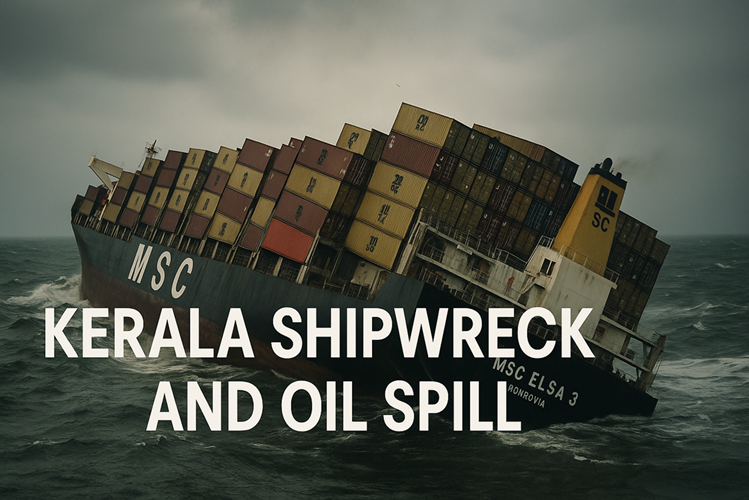In May, a large MSC ship capsized off the coast of Kerala, causing a massive oil leak. This accident didn’t just make headlines—it threatened the environment, public health, and local livelihoods. As the oil spilled into the Gulf of Kerala, concerns grew about long-term damage to marine life and the wellbeing of nearby communities. Now, the Kerala government has responded by filing a $1.1 billion lawsuit. This move highlights the urgent need for stronger safety laws, better pollution controls, and international cooperation to prevent future disasters.
The Incident: MSC Ship Capsizing and Oil Spill Details
Background of the MSC Ship
The ship involved was a container vessel owned by MSC, one of the world’s largest shipping companies. It was on a routine voyage when it encountered rough weather near the Kerala coast. The ship was built for transporting goods across oceans but was not designed to withstand severe storm conditions easily. Experts say a combination of heavy seas and possible equipment failure led to the vessel capsizing, exposing vulnerabilities in maritime safety.
Timeline and Magnitude of the Spill
The ship capsized in the early hours of May, and it took hours before the spill was fully detected. Initially, authorities weren’t sure how much oil was leaking. As days passed, it became clear the spill was large—around 5,000 barrels of oil flowed into the water. The affected areas stretched along several kilometers of Kerala’s pristine coastline, threatening beaches, fishing zones, and coral reefs. The spill’s scale raised alarms among environmentalists and local residents alike.
Immediate Response and Containment Efforts
Once the spill was identified, coastguards and environmental agencies launched cleanup operations. They deployed booms, skimmers, and dispersants in an effort to contain the oil. Yet, the rough seas and strong winds made it difficult to control the leak fully. Some containment strategies worked temporarily, but the oil continued to spread, causing ongoing damage. Despite these efforts, limited resources and weather conditions hindered swift, complete cleanup.
Environmental and Public Health Impacts
Marine Ecosystem Damage
The spill hit Kerala’s marine environment hard. Coral reefs, home to many species, suffered smothering and destruction. Fish populations declined, and delicate ecosystems like mangroves and seagrass beds showed signs of stress. Certain marine species, including sea turtles and coastal birds, were found coated in oil, risking long-term survival.
Coastal and Livelihood Consequences
Oil washed ashore on beaches popular with tourists and locals. Fishers reported declining catches due to contaminated waters. Businesses dependent on tourism faced severe losses. Many fishing communities found their primary source of income threatened because of water pollution and unsafe harvests.
Public Health Risks
Local residents and cleanup crews faced exposure to toxic fumes and chemicals from the oil. Respiratory issues, skin rashes, and other health problems appeared among those involved in cleanup work or living nearby. Long-term health effects are still uncertain but could include increased risks of cancer and respiratory diseases, making this spill a crisis for public health.
Legal Actions and Policy Responses
Kerala Government’s $1.1 Billion Lawsuit
In response, Kerala’s government filed a massive lawsuit worth $1.1 billion. They argue that the spill caused irreversible damage to the ecosystem, harmed public health, and hurt local economies. The case claims the shipping company failed to take adequate safety measures, violating environmental laws. Jurisdiction was debated, but authorities are confident they have grounds under Indian and international maritime laws.
International Maritime and Environmental Laws
This incident raises questions about the effectiveness of global laws like MARPOL and UNCLOS. These agreements aim to prevent pollution and protect oceans, but enforcement can be weak. Many cases, globally, have shown that shipping companies often escape full liability, highlighting a need for stronger compliance and penalties.
Policy Gaps and Recommendations
Right now, India and international agencies are reviewing safety standards for ships operating near sensitive coastlines. Experts call for stricter regulations, better tracking of ships, and faster emergency responses. International cooperation should be strengthened to share best practices and prevent similar incidents elsewhere. Policy reforms could close loopholes that allow ships to operate without sufficient safeguards.
Technological and Procedural Improvements Post-Spill
Advances in Ship Design and Safety Equipment
Modern ships now include better stability features to prevent capsizing. Improved safety gear, including automatic leak detection systems, can alert crews before a disaster happens. These technological advances make ships safer and reduce pollution risk.
Improved Spill Response Technologies
New methods like quick deploying containment booms and advanced cleanup chemicals help limit environmental damage when spills occur. Researchers are developing better dispersants and biodegradable materials that are less harmful to marine life. Rapid response remains crucial to minimizing long-term harm.
Training and Capacity Building
Coastguards and responders need extensive training to handle spills efficiently. Community engagement programs can educate fishermen and locals about oil spill risks and safety measures. Building capacity ensures faster, more effective responses that lessen the damage.
Future Outlook: Prevention, Compensation, and Ecosystem Restoration
Enhancing Maritime Safety Regulations
Reforms inspired by this incident could lead to stricter safety checks for ships passing along India’s coastline. Clearer monitoring and tighter enforcement can prevent hazards before they happen. Technological upgrades, like GPS tracking and automated safety alerts, will boost maritime safety.
Compensation and Restoration Strategies
Restoring Kerala’s ecosystems requires a clear plan. It includes replanting mangroves, cleaning beaches, and rehabilitating fish stocks. A fair compensation system should also support local businesses and fishermen impacted by the spill. Governments, companies, and NGOs must work together to rebuild affected communities.
Role of Public Awareness and Community Engagement
Educating residents about oil spill risks helps communities prepare for emergencies. Promoting sustainable fishing and tourism reduces pressure on already fragile ecosystems. When everyone understands their role, Kerala can better protect itself from future disasters.
Conclusion
The Kerala oil spill caused by the MSC ship’s capsizing shook the state’s environment, economy, and public health. It’s a stark reminder that maritime safety isn’t just about ships—it’s about protecting our communities and ecosystems. Strengthening legal frameworks, investing in new technology, and fostering international cooperation are vital steps forward. Only by working together can we prevent future tragedies and secure a healthier, safer coast for generations to come.
|
|

